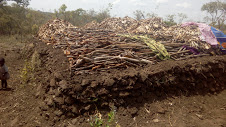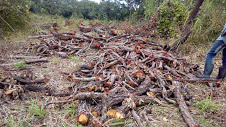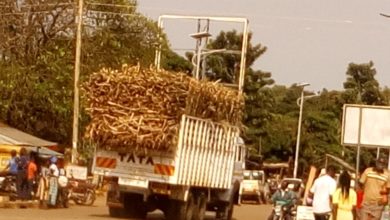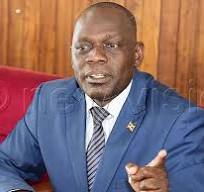
Global Politics
UGANDA: ACHOLI SUB REGION IS WITNESSING ENVIRONMENTAL AND POLITICAL VIOLENCE AFTER NORTHERN UGANDA POST CONFLICT-ENVIRONMENTAL EXPERTS
Acholi cultural leaders gang up against warlords forced out environmental degradation from Gulu District
Special Report By Okumu Livingstone Langol and John Mudi-

woneki
Acholi cultural leaders gang up against warlords to force out environmental degradation from Gulu District.
GULU-UGANDA: The Director for African Center for Research Gulu University Don. Arthur Owor says the situation of Environmental Degradation in Acholi, after the Lord’s Resistance something we now see with knee attention to. “We are now looking it at as an extension of a new political violence.”
Owor, who is heading environmental activists against forest destruction in Acholi Sub Region with the group cord name, “Our trees we need answer.” Says in other word the frontier of war has moved from political violent to environmental depletion as a form of disabling Acholi entirely.
“Many actors in senior military ranks, the political elites and businessmen from the South having very close links with government those from rural communities are involved in large scale charcoal businesses; illegal loggings are the indicators of violence” Owor observes.
He argues that at most 2/3 of forest in Acholi land has been destroyed; the situation in Palaro Sub County in Gulu district is a case study which they have used for the campaign.
He says climate change is a result of deforestation and other environmental degradation which threatens lives of citizens in coming age.
Although “Our trees needs answers” held several campaign against the environmental cruelty, it has achieved little to stop the cartel.
Area such as Ora-Pwoyo village in Binya Parish, in Odek sub-County in Omoro district and Palaro are the clear places raising concern.
There were smaller attempts b community members expelling the aliens from commercial charcoal businesses but in most laces the dealers are said to be armed with guns and dangerous.
In some situations the trucks loaded with charcoal and logs are escorted by Soldiers armed with guns and wearing military fatigue.
In August 2019, environmental Police headed by Xvaiar Sekanabo attached to the Ministry of Water and Environment in Kampala impounded three trucks loaded with charcoal from Palaro and arrested three dealers. However they were released the next day before the matter could reach court.
“Our duty is to stop this cartel, whether you are a police officer or a UPDF officer, ours is to arrest you and prosecute you. No compromise,” Sekanabo says.
The two days of the operation against charcoal business was a window dressing. It coincided with an International Conference on climate change which took place in Hotel African in Kampala.
Residents and elders in Palaro Sub-County, north of Gulu district have issued a fourteen Days of ultimatum for charcoal dealers to vacate the area but when the dealers ignored it, communities hunted them one by one and bundled them into their trucks this November 2019.
The bush hunting of charcoal dealers was ignited by the killing of a young boy and later he was buried secretly by the aliens.
The matter became a security issue. The district resident Commissioner Major Santo Okot Lapolo, the District Internal security organ joined hand to back the local process to dislodge the charcoal dealers.
The Ministry of environment has issued directive to the Police and local government leaders to halt tree cutting especially protected species such as Afrizeila African and shear nut tree, and mango tree. This pronouncement has never been closely adhered to.
Now that the Charcoal dealers have left with sources intimating their numbers to 3000 in Palaro Alone, other places such as Atyak and Pabbo sub-counties are still lucrative areas of the business.
They are also getting worrying report; some of them are tracking back to Palaro Sub County again. But over all, we are happy that community’s’ initiative is having much result.
“Some of the Charcoal dealers and nomads had Rwandese National Identification cards,” Owor reiterated “What they are doing also is to marry the natives and people suspect it’s a new strategy to get their land.”
In June this year, the Resident district commissioner of Amuru district Linda Auma says the nomads and charcoal dealers use Nile River to transport the cows and logs from Amuru to Nebbi district.
Owor says Nwoya district is taking the local community approach to end the cartel.
In Lamwo distict, Minister for disaster Preparedness Hon Hilary Onek is champion for this strategy when he instructed the local community to take the matter in their hands, going far to incite them to burn the trucks, carrying logs.
Onek who traveled with Aswa Regional Police Commander Ezekiel Emitu and district Police commanders and accused them of failing to halt the cartel.
“I have learnt that some police officers are in logging and charcoal deals, so I have lost it with you! I now empower you to take the matter into your hands and if necessary burn their trucks so they feel it,” Onek says.
To fight the log cartel requires huge campaign finances which is not readily available, says Owor “other places like Orom Sub-County in Kitgum district and Agago which are hard to reach enabling the cartel to elude us.”
However, the campaign message calls upon the communities to preserve rare and wild indigenous species of trees for food, medicine, and spiritual and for rainfall purposes.
Willy Choo Woo is a researcher under Our trees needs answer remarks that “people should cut trees only for purpose of opening their fields for crop production.”
“I told them to diversify crop production to palatable crops such as cabbage, tomatoes which take s little land and yield high output,” adds Choo woo.
Many community members were ignorant about importance of the trees, but the campaign was an eye opener to them. “They woke up like an hungry lion and others ran to the bushes to hunt these destroyers”, Choo Woo
Choo Woo says in places like Koch Lii, locals hire their land cheaply but the renters begin to claim title deeds of the land.
The business has lasted for seven years on. The locals hire land due to poverty stricken northern Uganda which UBOS puts it to 60 %.
Amuru district Chairman Michael Lakony accuses the Police of being conduit of the cartel.
“We are leading in charcoal business especially Pabbo Sub-County when communities impound the charcoal trucks, the police officers side with the charcoal dealers who are their own Bantu people,” Lakong says.
Unlike Lakony lamentation, Gulu District Chairman Matin Ojara Mapenduzi is a no nonsense man.
in 2017, he led Acholi Environmental Team to inspect the magnitude of tree destruction, used corporal punishment to awaken the cartels decisions.
“Why do you come here to destroy our trees, are there no trees in Nakasongola? Are there no trees in Central Region? I cane you, I cane you; stupid,” Ojara lectured charcoal dealers in Loyo Ajonga villages when he rounded up them with police.
Oloya Tebere in a number of workshops in Gulu has been spearheading the fight to stop the tree cutting and charcoal burning.
“We are working on an ordinance which will empower communities to introduce variety of trees that mature faster and renew packaging and branding which fetch high prices,” Tebere says.
Executive Director of Lakim Miller in Gulu Bernard Lakony says some of the other interventions would popularized is the production of charcoal briquette where tree wastes for charcoal production.
“We want to provide low cost energy producing briquette and offer energy saving stoves” Lakony says.
Lakony says they will appeal to government to subsidize bio gas, electricity for urban dwellers and help in research activities on renewable energy.
Twelve years on, when the gun fell, the people in Northern Uganda hope there would be permanent peace in the region.
However, this dream remains elusive. A new conflict generated within the state government has begun eating them this time against their environment-the Tree cartel. End





